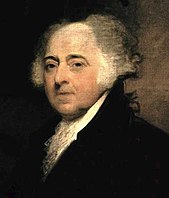John Adams
Apariencia
| John Adams | |||||||||||
|---|---|---|---|---|---|---|---|---|---|---|---|
 |
|||||||||||
| Véase también | |||||||||||
| Esta página contiene citas de una persona fallecida hace 198 años. | |||||||||||
John Adams (Braintree, Masachusets, 30 de octubre de 1735 – Quincy, Norfolk, 4 de julio de 1826) fue un estadista, segundo presidente de los Estados Unidos.
Citas
[editar | editar código]- «Estoy de acuerdo con usted en que en la política la vía del medio es ninguna».
[I agree with you that in politics the middle way is none at all]. [1]
- «Hay dos formas de conquistar y esclavizar a una nación. Una es la espada, la otra es la deuda». [2]
- «Todos los gobiernos dependen de la buena voluntad del pueblo».[3]
Digresiones
[editar | editar código]- «Estoy dispuesto a que llame a esta la Era de la Frivolidad como lo hace, y no tendría objeciones si usted la hubiese llamado la Edad de la Locura, el Vicio, el Frenesí, la Brutalidad, los Demonios, Bonaparte, Tom Paine, o la Edad del Sellado del Pozo Sin Fondo, o cualquier cosa menos La Edad de la Razón. No sé si algún hombre en el mundo ha tenido más influencia sobre sus habitantes o sus asuntos en los últimos treinta años que Thomas Paine. No puede haber sátiro más severo en la edad. Por tal chucho entre cerdo y cachorro, engendrado por un jabalí salvaje en una loba perra, nunca antes en ninguna edad del mundo se ha sufrido la poltronería de la humanidad pasando a través de semejante carrera de malicia. Llámela entonces La Edad de Paine».
[I am willing you should call this Age of Frivolity as you do, and would not object if you had named it the Age of Folly, Vice, Frenzy, Brutality, Daemons, Buonaparte, Tom Paine, or the Age of the Burning Brand from the Bottomless Pit, or anything but the Age of Reason. I know not whether any man in the world has had more influence on its inhabitants or affairs for the last thirty years than Tom Paine. There can be no severer Satyr on the age. For such a mongrel between pig and puppy, begotten by a wild boar on a bitch wolf, never before in any age of the world was suffered the poltroonery of mandkind, to run such a career of mischief. Call it then the Age of Paine». [4]
Referencias
[editar | editar código]- ↑ Carta a Horatio Gates, 23 de marzo de 1776. The works of John Adams, second President of the United States. Volume 1. Editor Best Books on, 1856. ISBN 9781623764623. p. 206.
- ↑ Soriano Llobera, Juan M. Prensa económica, ¿Ángel o demonio?, de la democracia a la actualidad. Editorial Bibliolibrary Editorial, 2012. ISBN 9788493949228. p. 108.
- ↑ Ortega (2013), p. 3500.
- ↑ Carta de 29 de octubre de 1805. Citado por Jack Fruchtman Jr., The Political Philosophy of Thomas Paine, p. 3. JHU Press, 2009. ISBN 9780801892844.
